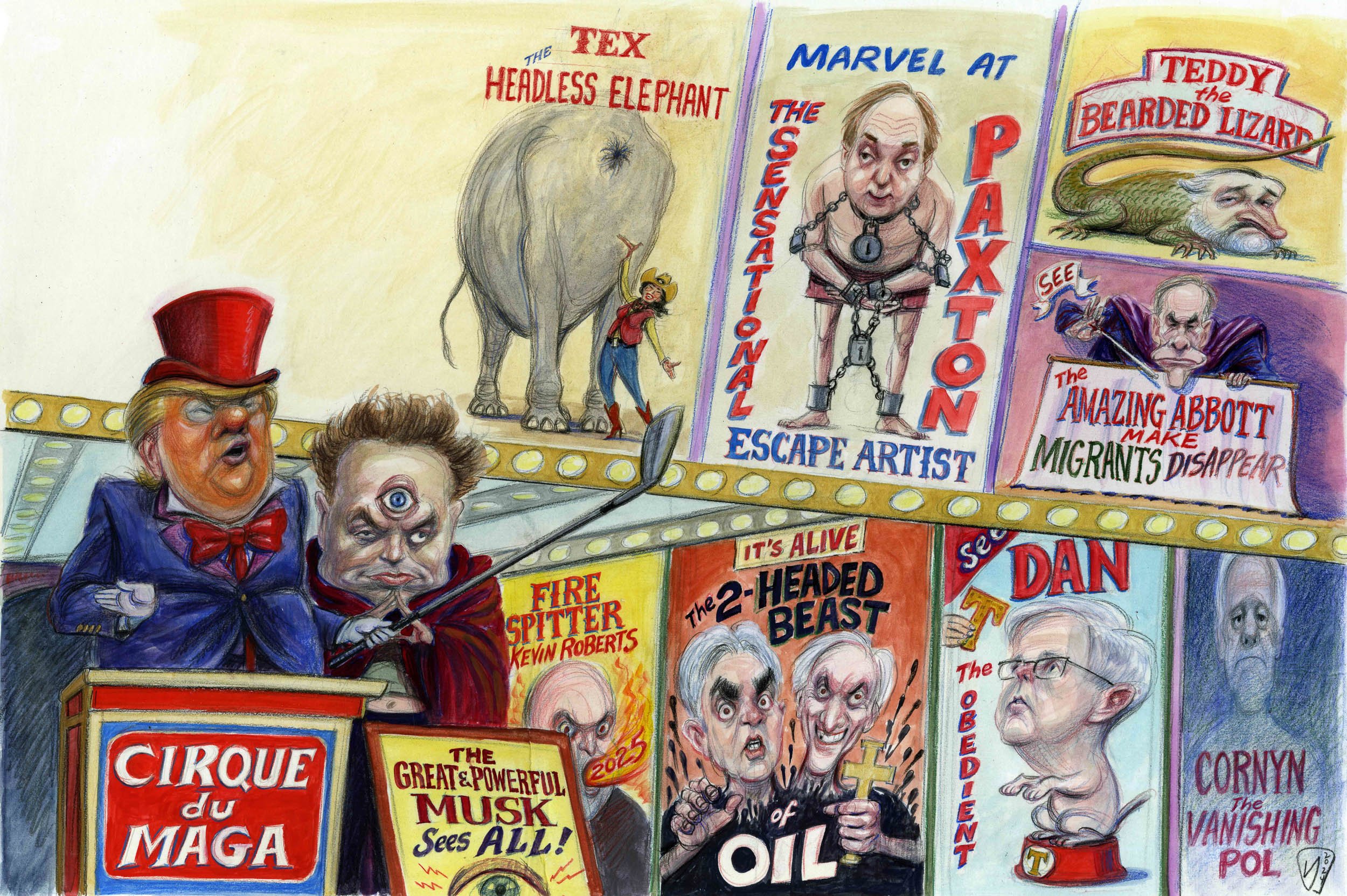Bad Bills
Killing Cities and Cutting Taxes
IRON LAW OF STUPIDITY
H.B. 3557 Talmadge Heflin, R—Houston
From the man who argued last session that a sales tax on groceries was not an unfair burden on the poor – and supported his position by observing that in his district, lots of poor people eat fast food and don’t complain about the restaurant tax – comes a perfectly rational budgetary imperative: state spending cannot grow any more than does the state’s economy. Heflin’s bill would require the Legislative Budget Board to calculate the growth of the state’s economy, then link all spending to the rate of growth. In a recession, when the economy is shrinking and unemployment increasing, this bill would mandate the perfect knee-jerk response from government – less assistance (not to mention hamstringing any attempt at economic redevelopment). Heflin apparently wants to appropriate Ricardo’s Iron Law of Wages and apply it to the budget process – something like treating gangrene with a tourniquet.
DON’T BURN THAT DRAFTCARD!
H.B. 558 Bob Hunter, R—Abilene
Remember the sixties? Protests in the streets, draft resisters in jail or Canada, sex, drugs, rock ‘n’ roll? George Bush says he does, and has made his presidential campaign something of a public atonement for the sins of his generation. And so does “Dr.” Bob Hunter, the chirpy little “doctor” from Abilene, the only self-titled non-medical “doctor” in the House (1967 L.L.D., Pepperdine University). Hunter was a Navy intelligence officer and is determined that no one in the draft-age generation will avoid the draft – although there is no draft. His bill would make anyone not registered with the Selective Service System ineligible for employment by a state agency. (Heads up: the bill would not apply to draft dodgers who went to work for the state prior to September 1, 1999.)
THE UNGREEN PARTY
H.B. 1667, H.B. 3400, H.B 3244 Ricky Green, R—Dripping Springs
Ricky Green defeated Democrat Alec Rhodes by thirty-six votes in a runoff and has interpreted that victory as a mandate to dismantle the environmental protections the city of Austin has put in place in its extraterritorial jurisdictions. H.B. 1667 would make it impossible for a city to annex property in an adjacent county without the permission of the county commissioners. H.B. 3400 would make it “illegal for a municipality to enforce a water pollution control and abatement program or regulate or control non-point source water pollution” in an adjacent county – without the consent of that county and the groundwater conservation district in that county. Most legislators who draft bills to apply to a particular municipality they are attacking at least attempt to disguise their intent. Not Ricky, whose selective assault on Austin is flagged in the caption of H.B. 3400’s first subsection: “Limitation of Water Pollution Control Authority of Certain Municipalities.” But H.B. 3244 is not a local bill, and if passed, would make it easier for polluters to befoul the water in any county in the state. It is based on the cost-benefit analysis fraud perpetrated by the Wise Use Movement (which holds that government cannot regulate what private property owners do on private property). It would prohibit the Natural Resource Conservation Commission from issuing a rule to protect groundwater unless the agency can prove in advance the rule would improve groundwater quality. And if the rule somehow results in increased housing costs (e.g., by requiring sewage controls), the T.N.R.C.C. must demonstrate that “the benefit to groundwater quality is proportionate to the increase in housing costs.” How to “demonstrate” that? The answer is that you can’t, and therefore no groundwater protection rule can be issued.
SO SUE YOURSELF
S.B. 614 Senator David Sibley, R—Waco
“Tort reform” – the decade-long national campaign to limit the liability of corporate and commercial defendants, will probably not end until injured parties are left to sue themselves and hope their homeowners’ policy will cover the damages. House Speaker Pete Laney put the program on hold last session, after reminding the Texans for Lawsuit Reform reps in the House that they had gotten so much in the ’95 session it was time to let the reforms work. This session’s big tort reform bill [S.B. 274] may be D.O.A., because after the Senate it will have to get through Houston Democrat Fred Bosse’s Civil Practices Committee. But S.B. 614, David Sibley’s third-party liability bill, is alive, and would make it very difficult for someone injured by one party because of the negligence of a third party (such as an employer or business owner) to hold the third party responsible. Such lawsuits are common, for example, against convenience-store owners who fail to provide secure premises for their own employees, or apartment owners who cut corners on security and make violent crime against tenants more likely.
The bill was very much alive in mid-April, when Houston tort reformer (and developer) David Weekley showed up outside the Senate. Weekley’s Texans for Lawsuit Reform has contributed millions to candidates from both parties, and achieved much of the agenda defined by the business community it represents. But its strong-arm tactics have so offended many lawmakers that the group has had to lower its profile this session, allowing the Texas Association of Businesses and Chambers of Commerce to carry its agenda. But T.L.R. still got crosswise with Houston Rep Harold Dutton, mailing out a “fact sheet” to residents of districts of members of the Civil Practices Committee. When Dutton discovered that they got their facts wrong in the cases they cited (one of which was Dutton’s case), he took issue with both the targeted mailing and the targeted audience. Dutton packaged the materials with an angry letter to Sibley’s tort-dodging Economic Development Committee. Bosse, Dutton, and other Dems on Civil Practices may well hold off Weekley’s latest assault on plaintiffs’ rights – at least until 2001.
If you would like to nominate a candidate for “Bad Bills,” please fax the Bad Bills Girl at (512) 474-1175, or e-mail “[email protected]”.


